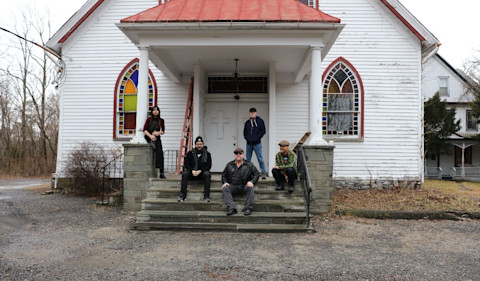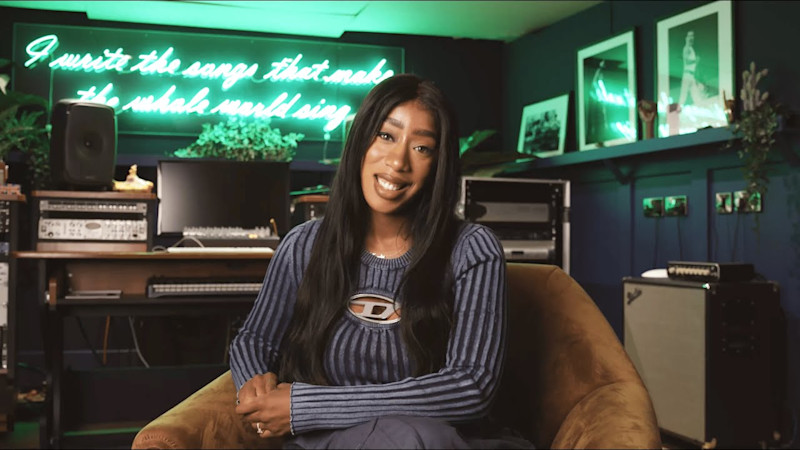It’s often assumed that the lifestyle of a working musician and that of a parent represent opposite ends of the spectrum of human existence. But since giving birth to her son two years ago, Brooklyn-based indie-rock artist Sharon Van Etten has discovered being the former is actually great training for becoming the latter.
“Musicians are used to working on no sleep,” she says with a laugh. “And you’re getting by on adrenaline—you’re waking up in a new city exhausted, but you’re excited to really go out and see it because you don’t have a lot of time. So that kind of lifestyle prepared me a little bit for parenthood.”
And when you consider the fact that playing in clubs and tending to cribs both involve some degree of screaming, foul stenches, and avoiding puke, you realize that life with a baby is not unlike being trapped at a 4AM SXSW after-party for the rest of your life. Look at the cover of Van Etten’s radiant 2019 release, Remind Me Tomorrow, and you’ll see two young children basking in an apocalyptic bedroom mess that could rival the rowdiest backstage bender.
![Sharon Van Etten Photo by Ryan Pfluger]()
Sharon Van Etten Photo by Ryan Pfluger
You can’t be in two places at once
For all their surface similarities, though, the lives of parents and performers are ultimately separated by a fundamental, seemingly irreconcilable difference—one job demands that you be at home, the other requires you be away from it for long stretches. On top of dealing with all the usual on-tour stressors, musicians with kids must also grapple with the guilt of missing out on the crucial moments in their little ones’ lives, from first steps to school plays. And while technology has no doubt made it easier to keep tabs on the homestead, a choppy FaceTime call is still no substitute for a hug or kiss goodnight. But Van Etten has now reached the point in her career where, if she can’t be at home all the time, she can at least bring her home to the road some of the time.
Remind Me Tomorrow is the first album Van Etten has released since becoming a mother. And it fortuitously arrives at a juncture when, after steadily building her fervent fanbase over the past decade, she can graduate to the tour-bus level. For any indie-level musician who’s been grinding it out on the club circuit for years, making the leap from a cramped, smelly van to a spacious coach is a career milestone on par with getting a gold record or playing Colbert. But for parents on tour, the bus represents more than just convenient access to a fridge, big-screen TV, and clean (well, for a few days at least) toilet. It also opens up a possibility that’s just not feasible when you’re traveling on four wheels and crashing on strangers’ floors: bringing the kids out on the road.
Earlier this year, Van Etten took her toddler for a week of dates, along with a sitter she met through neighborhood friends. However, as she soon discovered, what seems like a best-of-both-worlds scenario on paper is actually a lot more complicated to pull off in practice.
“I didn’t know how to be present for my band and my son, and to help the sitter,” she recalls. “I felt like, all of a sudden, my roles were divided. And it was hard for the sitter to take him out all the time when he just wants to be with me. Most venues aren’t really close to anything, and if the weather was bad, there was really nowhere to go. Seeing how limited he was in recreational access, I just felt it was unfair to him and the band.” Van Etten adds that space was tricky, too—with 10 people plus a toddler sharing space, even a tour bus starts to feel claustrophobic. Most of the time they’d forgo booking a hotel, but the result was that her son didn’t get his customary wind-down of a bedtime bath, and his sleep schedule suffered.
![The National by Graham Macindoe]()
The National by Graham Macindoe
Finding the right compromise
In the end, Van Etten realized that, as much as it’s hard for her to be away from her son when she’s on tour, it was a lot harder for him to adjust to life on the road and then resume his normal life back home. So for now, the boy will stay home with her partner, while mom will limit her touring to two-week spurts. “Even though it’s more lucrative to go out for three or more weeks and cover more ground, the emotional cost of not being physically present outweighs the money you make,” she says.
That’s a lesson her friends in The National learned when they began having kids 10 years ago. At the time, the Brooklyn-via-Cincinnati group were in the midst of their gradual ascent from small-theater headliners to arena act, but even as their audience was growing exponentially with each record, the band made a pact to never tour more than two or three weeks at a time. And it’s one they’ve stuck to as they prepare to tour North American and Europe in segmented fashion this year behind their elegant new double album, I Am Easy to Find.
As multi-instrumentalist Aaron Dessner reveals, “We’ve all been through difficult existential crises with the duality of trying to be present and involved and super hands-on parents, but also be in a band that is on the road a lot, and recognize the financial security of our families is directly tied up with the fact that we have to tour. You’re pulled in two directions at once.”
But while The National are now at the level where they can travel comfortably, hire professional nanny services, and host a roving rock ‘n’ roll daycare center if they want to, Dessner—a father of three—says the band is very particular about when to include family in their travel plans, if ever. For instance, the band’s frontman, Matt Berninger, doesn’t ever bring his daughter on tour “because he has to preserve his energy all day long, so that when he does perform, he can turn into a real tornado.” And in Dessner’s case, he prefers to plan around special events that can double as family vacations.
“If we take the kids on tour,” he says, “it’s because we’re playing multiple shows somewhere in New York or L.A. or Paris, where we have a lot of friends, so it’s fun for the families. Or if The National are playing two weeks of shows in Australia, we’ll all go down there for a month around that. But when you’re really on tour, moving from one city to the next every day, it’s really hard, because it’s not that interesting for the kids. It only really works if the kids stay put in one place for a period.”
Ultimately, Dessner says, having more time at home doesn’t just benefit his family, but his band as well, thanks to the constant creative inspiration his kids provide. Case in point: He came up with the guitar melody to 2014 single “I Need My Girl”—The National’s most popular track on Spotify at 80 million-plus streams—while making up lullabies for his daughter Ingrid when she was an infant.
“People used to call us ‘dad-rock’ as an insult,” he says, “but we all take it as a giant compliment!”
—Stuart Berman








